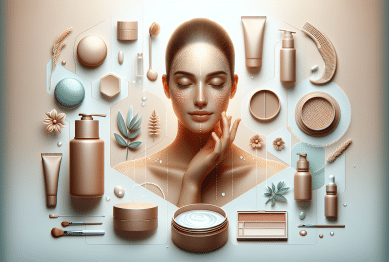Curious about how collagen influences radiant skin, elasticity, and a youthful appearance? This guide demystifies collagen’s role, popular supplement choices, dietary connections, and real research on how it affects wellness and beauty over time.
Understanding Collagen and Its Impact on Skin Vitality
Collagen is often described as the body’s natural scaffolding, supporting the skin, bones, and connective tissues. As one of the most abundant proteins in the human body, it offers remarkable structural integrity to skin—keeping it resilient and plump. Many seek collagen supplements or topical products in hopes of boosting skin elasticity and reducing the look of fine lines. But what does collagen really do? Scientifically, collagen forms elongated fibers that reinforce skin’s firmness. Over time, natural production slows, leading to visible aging changes. These structural changes are subtle at first but accumulate over decades. Understanding this process provides useful context for anyone interested in skincare beyond surface-level claims.
Skin health relies on a balanced cycle of collagen breakdown and renewal. Everyday habits like sun exposure, smoking, and poor diet accelerate this breakdown. Environmental factors can increase free radicals, damaging skin’s natural defense mechanisms. As collagen production drops, people may notice sagging or deeper wrinkles. But it’s not all loss—lifestyle choices can moderate this pace. Research has shown that sun-protection, hydration, and certain nutrients—such as vitamin C and amino acids—help preserve the body’s natural collagen stores longer (https://www.cdc.gov/nutrition/index.html). Thoughtful daily choices provide a solid foundation for maintaining skin vibrance from within.
Many are drawn to collagen for its promise of youthful skin. It’s crucial to look at the evidence carefully, separating marketing from measurable benefits. According to the American Academy of Dermatology, while skin naturally loses collagen, prevention isn’t simply about supplementation—it starts with understanding how collagen works in context. Awareness around collagen’s biological role allows for more informed decisions and realistic expectations. By appreciating both the science and practical aspects, individuals can pursue wellness and beauty goals that are both effective and sustainable.
Dietary Habits and Collagen Production: What to Know
The body creates collagen from the foods consumed each day. Key nutrients—especially protein, vitamin C, copper, and zinc—support collagen synthesis. Protein-rich foods like chicken, fish, beans, and eggs offer essential amino acids. Citrus fruits, berries, and leafy greens are reliable sources of skin-friendly antioxidants. This nutrient synergy is why balanced eating habits matter for glowing skin. Many overlook these basics, seeking shortcuts through supplements, but diet remains the backbone of healthy collagen levels (https://nutrition.org/eat-right-with-color/).
Collagen-boosting ingredients are not limited to animal products. Plant-based eaters can obtain what they need by combining lentils, nuts, and seeds with vitamin C-rich produce. These options support amino acid availability, which the body assembles into collagen fibers. There is increasing interest in the benefits of whole-food-based collagen support, as it fits a wider range of lifestyle choices. By centering meals around diverse, unprocessed foods, it’s possible to enjoy tangible improvements in both wellness and appearance. Nutritious, varied eating patterns support the skin’s ability to regenerate and stay resilient over time.
For those curious about collagen supplements versus food-based sources, the evidence suggests that while supplements can increase specific peptide levels in the blood, dietary patterns play a vital, ongoing role. What someone eats regularly will ultimately have more lasting effects than a single product or pill. Over-reliance on one approach may overlook critical nutrients needed for collagen formation. Focusing on a diverse and nutrient-rich diet supports whole-body wellness and encourages skin that looks refreshed and youthful at any age.
Collagen Supplements: Facts, Myths, and What Studies Reveal
Interest in collagen supplements—powders, capsules, and drinks—has grown rapidly. Promises range from firmer skin to strong nails and vibrant hair. But what do objective studies say? Clinical trials show some benefit, especially for age-related skin concerns. Short-term use of hydrolyzed collagen peptides (the most common form) has been linked to modest improvements in skin hydration and elasticity in select populations (https://www.ncbi.nlm.nih.gov/pmc/articles/PMC6835901/). However, outcomes can vary, and not all products are formulated equally.
It’s important to note that the benefits seen in studies are often subtle. Supplements may help some individuals see smoother, more hydrated skin when combined with healthy habits. The placebo effect also plays a role, making it tricky to separate true effect from expectation. Researchers caution that supplements should not replace nutrient-rich foods or proper skincare. Instead, they’re best viewed as additions to an already health-conscious routine, rather than miracle solutions. Labelling and quality standards vary between brands, so reading ingredient lists and clinical research is key.
Busting common myths, not all collagen products work equally. Collagen in creams, for example, likely won’t penetrate deeply because the molecules are too large. Oral peptides are generally better studied. Still, absorption rates depend on factors like digestion and overall health. Combining supplements with sun protection, proper sleep, and a nutrient-dense diet maximizes visible results. Always consult a healthcare professional about new regimens, especially if pre-existing conditions or allergies are present.
Lifestyle Factors That Preserve Collagen for Radiant Skin
It isn’t just diet and supplements that impact collagen. Daily lifestyle patterns, such as regular sleep, consistent hydration, and physical activity, all work together to keep collagen renewal steady. Drinking water throughout the day helps deliver nutrients to skin cells, while restful sleep allows for cellular repair and new collagen formation. Exercise, especially resistance activities, may stimulate natural growth hormone production, further supporting collagen synthesis (https://www.sleepfoundation.org/how-sleep-works/why-do-we-need-sleep).
Protection from environmental stressors is another cornerstone of lasting skin health. Ultraviolet (UV) rays are among the most potent accelerators of collagen breakdown. Wearing sunscreen, limiting sun exposure during peak hours, and using antioxidant-rich skincare can all make significant impacts. Smoking and excessive alcohol consumption are best minimized, as both contribute to premature collagen loss. Making mindful lifestyle improvements is a sustainable way to support natural beauty, regardless of age.
Daily routines influence not only visible appearance but long-term skin resilience. Gentle cleansing, moisturizing, and occasional exfoliation support skin’s ability to renew and repair. Prioritizing a calm mind through meditation or stress-reduction techniques can moderate cortisol levels, minimizing damage to collagen structures. These simple but consistent habits, practiced over time, lead to a complexion that glows from within. Step by step, small changes add up to significant differences in how skin looks and feels.
Evaluating Collagen Claims: What Research Suggests
Consumers encounter many bold collagen claims. Not all are substantiated by robust research. Well-conducted clinical trials remain the gold standard for evaluating supplement effectiveness. Findings generally indicate that collagen supplements—when used as directed and alongside good nutrition—may modestly improve some markers of skin aging, such as hydration and elasticity (https://www.aad.org/public/cosmetic/anti-aging-skin-care/collagen). Yet, results differ between individuals and are best understood as part of a broader self-care approach.
There’s little evidence that collagen offers instant or dramatic results. Instead, benefits appear gradually and depend on the body’s ability to use and rebuild proteins over time. Research is ongoing, and scientists are investigating new forms of marine, bovine, and plant-based collagens for skin-care applications. Visiting reputable educational sites or reviewing published studies can help clarify which claims are realistic and which are exaggerated.
If considering collagen supplementation, always look for products tested by third parties, preferably supported by published research. Transparency in sourcing and ingredient lists matters. Working with a dermatologist or nutrition expert helps tailor choices to individual wellness goals. By relying on evidence and expertise, people can steer clear of fads and make choices that truly contribute to beauty and well-being.
Integrating Collagen Insights Into Your Wellness Routine
For those interested in integrating collagen strategies, the first step is a realistic self-assessment: Is your nutrition balanced? Do daily habits support overall health? Fine-tuning meal plans to include a variety of protein and vitamin C sources tends to yield positive shifts in skin tone and energy levels. Staying hydrated and adopting other skin-friendly routines like sun protection build on the foundation created by nutrition and lifestyle.
Adding a reputable collagen supplement may be a reasonable next step, especially during periods of increased skin stress or when dietary options are limited. Remember that the best benefits arise when supplements complement, not replace, whole foods and mindful habits. Patience is key; changes in skin texture and radiance are gradual, requiring several weeks or months before visible effects emerge (https://www.medicalnewstoday.com/articles/287451).
As with any aspect of wellness and beauty, personalization matters. What works for one person may not suit another. Reviewing options, understanding the science, and speaking with professionals can help craft a sustainable approach to skin health. Over time, informed choices will empower a more radiant, confident appearance—one built on both science and self-care.
References
1. American Academy of Dermatology. (n.d.). Collagen supplements: Do they work? Retrieved from https://www.aad.org/public/cosmetic/anti-aging-skin-care/collagen
2. CDC. (n.d.). Micronutrient Facts. Retrieved from https://www.cdc.gov/nutrition/index.html
3. Nutrition.org. (n.d.). Eat Right With Color. Retrieved from https://nutrition.org/eat-right-with-color/
4. National Library of Medicine. (2019). Effect of collagen hydrolysate intake on skin. Retrieved from https://www.ncbi.nlm.nih.gov/pmc/articles/PMC6835901/
5. Sleep Foundation. (n.d.). Why Do We Need Sleep? Retrieved from https://www.sleepfoundation.org/how-sleep-works/why-do-we-need-sleep
6. Medical News Today. (n.d.). What to know about collagen supplements. Retrieved from https://www.medicalnewstoday.com/articles/287451










 Hidden Gems You Can Explore in Southeast Asia
Hidden Gems You Can Explore in Southeast Asia 

